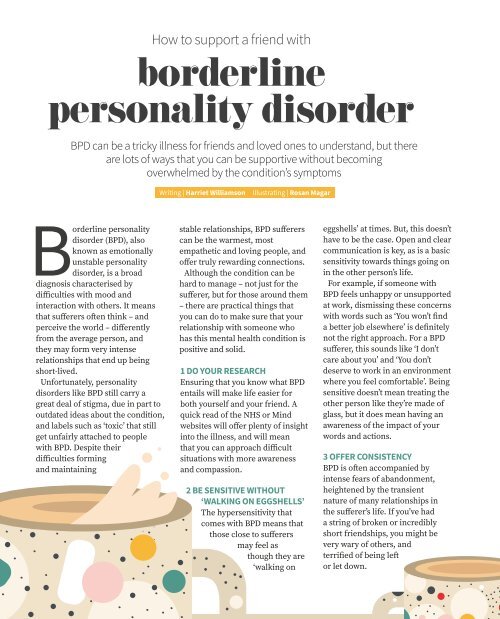Happiful November 2019
Create successful ePaper yourself
Turn your PDF publications into a flip-book with our unique Google optimized e-Paper software.
How to support a friend with<br />
borderline<br />
personality disorder<br />
BPD can be a tricky illness for friends and loved ones to understand, but there<br />
are lots of ways that you can be supportive without becoming<br />
overwhelmed by the condition’s symptoms<br />
Writing | Harriet Williamson<br />
Illustrating | Rosan Magar<br />
Borderline personality<br />
disorder (BPD), also<br />
known as emotionally<br />
unstable personality<br />
disorder, is a broad<br />
diagnosis characterised by<br />
difficulties with mood and<br />
interaction with others. It means<br />
that sufferers often think – and<br />
perceive the world – differently<br />
from the average person, and<br />
they may form very intense<br />
relationships that end up being<br />
short-lived.<br />
Unfortunately, personality<br />
disorders like BPD still carry a<br />
great deal of stigma, due in part to<br />
outdated ideas about the condition,<br />
and labels such as ‘toxic’ that still<br />
get unfairly attached to people<br />
with BPD. Despite their<br />
difficulties forming<br />
and maintaining<br />
stable relationships, BPD sufferers<br />
can be the warmest, most<br />
empathetic and loving people, and<br />
offer truly rewarding connections.<br />
Although the condition can be<br />
hard to manage – not just for the<br />
sufferer, but for those around them<br />
– there are practical things that<br />
you can do to make sure that your<br />
relationship with someone who<br />
has this mental health condition is<br />
positive and solid.<br />
1 DO YOUR RESEARCH<br />
Ensuring that you know what BPD<br />
entails will make life easier for<br />
both yourself and your friend. A<br />
quick read of the NHS or Mind<br />
websites will offer plenty of insight<br />
into the illness, and will mean<br />
that you can approach difficult<br />
situations with more awareness<br />
and compassion.<br />
2 BE SENSITIVE WITHOUT<br />
‘WALKING ON EGGSHELLS’<br />
The hypersensitivity that<br />
comes with BPD means that<br />
those close to sufferers<br />
may feel as<br />
though they are<br />
‘walking on<br />
eggshells’ at times. But, this doesn’t<br />
have to be the case. Open and clear<br />
communication is key, as is a basic<br />
sensitivity towards things going on<br />
in the other person’s life.<br />
For example, if someone with<br />
BPD feels unhappy or unsupported<br />
at work, dismissing these concerns<br />
with words such as ‘You won’t find<br />
a better job elsewhere’ is definitely<br />
not the right approach. For a BPD<br />
sufferer, this sounds like ‘I don’t<br />
care about you’ and ‘You don’t<br />
deserve to work in an environment<br />
where you feel comfortable’. Being<br />
sensitive doesn’t mean treating the<br />
other person like they’re made of<br />
glass, but it does mean having an<br />
awareness of the impact of your<br />
words and actions.<br />
3 OFFER CONSISTENCY<br />
BPD is often accompanied by<br />
intense fears of abandonment,<br />
heightened by the transient<br />
nature of many relationships in<br />
the sufferer’s life. If you’ve had<br />
a string of broken or incredibly<br />
short friendships, you might be<br />
very wary of others, and<br />
terrified of being left<br />
or let down.

















